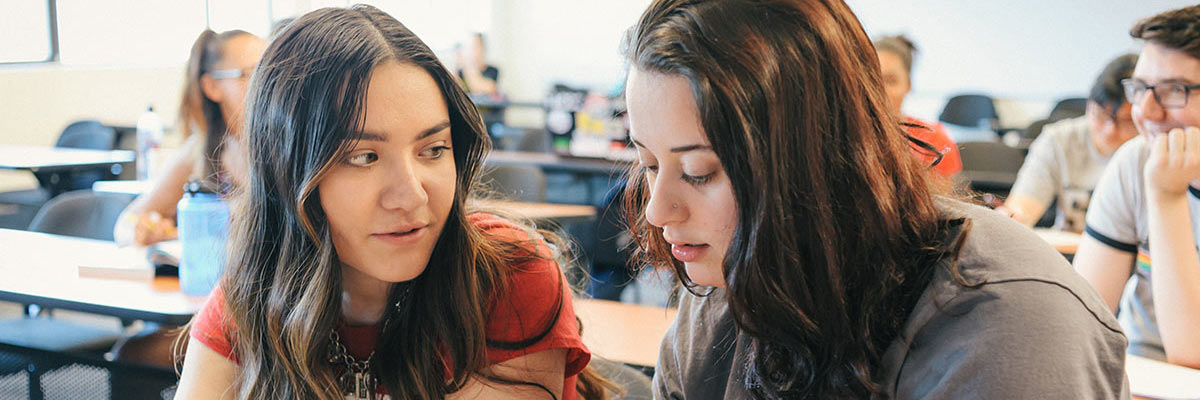General Education FAQ
Read our most Frequently Asked Questions.
Read our most Frequently Asked Questions.

What is General Education at SOU?
SOU’s compact General Education requirements kickstart your learning, seamlessly integrate with your major, and give you more opportunities to earn minors and certificates in other areas of interest. Our General Education program is made up of 39-44 credits. Students take a variety of lower-division and upper-division classes in subjects they select to develop their capacities for Purposeful Learning (PL), Communication and Expression (CE), Creativity and Innovation (CI), Inquiry and Analysis (IA), Numerical Literacy (NL), and Equity, Diversity, and Inclusion (EDI).
What are the goals of General Education at SOU?
At SOU, our GE learning goals focus on developing essential human capacities that transcend any one area of study. Rather than offering lists of required classes in specific disciplines, SOU emphasizes the development of human capacities in Purposeful Learning (PL), Communication and Expression (CE), Creativity and Innovation (CI), Inquiry and Analysis (IA), and Numerical Literacy (NL). Additionally, students explore essential self-reflective capacities related to values and cultural understanding, commonly called Equity, Diversity, and Inclusion (EDI), capacities that help us respond to our shared society’s complex and changing needs with empathy, mutual respect, and wisdom. As disciplines and fields of study continue to innovate and evolve, SOU knows these human capacities will always remain relevant and valuable.
How do I know which General Education courses count towards my degree?
Courses approved for General Education (GE) will have a capacity designation in the catalog and course schedule when registering for classes. Since General Education courses are selected based on faculty proposals demonstrating that the course meets specific learning outcomes, course listings evolve. Students can find the most up-to-date listing of classes that will fulfill General Education in several convenient places: the SOU online catalog, the Course Schedule (please use the Advanced Search drop-down menu when looking for specific courses offered in a particular term), and current students via DegreeWorks (when logged into inside.sou.edu, “Degree Works” under Online Services tab).
What does it mean when a General Education course "double dips"?
Some courses in SOU’s curriculum may “double dip,” but these are few. What this means in practice is that a single course may end up “double dipping” to fulfill a General Education capacity requirement and a major, minor, or certificate requirement. However, since our General Education program requires that students select courses without repeating disciplinary course prefixes (for example MTH, COMM, PSY, ENG, SOAN, etc.), courses will not usually “double dip” creating the opportunity for students to explore electives more freely.
Why are some courses included in General Education but not others?
Not all courses at SOU meet the objectives of the capacities that General Education prioritizes. Because General Education courses are accountable for strengthening specific capacities, programs and instructors must apply for their courses to be included in the General Education curriculum. Programs and instructors decide to submit classes for inclusion in the General Education catalog, and representatives of the whole faculty of Southern Oregon University review their applications.
Will courses taken at other schools transfer as course equivalents for General Education courses at SOU?
Courses taken at other institutions may qualify as fulfilling part of the General Education curriculum at SOU. We do our best to help students work towards their degrees efficiently, and we accept many transfer courses as meeting General Education requirements. When considering courses for transfer credits, if our lower division capacities can be linked to an existing course in a direct match, the course will count towards GE. If no direct course match can be related to the course a student wishes to transfer; any 3-4 credit Lower Division course may count in the appropriate disciplinary area. One exception to this would be the Purposeful Learning Seminar sequence which transfers specifically to WR 121z, WR 122z, and a COMM class.
If students would like to transfer courses that have not been recognized as counting for General Education, they may consider filing a Petition for Substitution. Courses from institutions not listed on the transfer student website may still be considered for General Education credits with clear documentation of the work completed.
Will courses taken while studying abroad serve as course equivalents for General Education?
Yes! Learners should consult with their academic advisers or a major advisor to discuss a plan before they travel.
Will Upper Division 300-400 level courses fulfill Lower Division 100-200 level equivalents for General Education?
No. Typically transfer courses that fulfill General Education capacities are lower division (100–200 level) courses taken at a community college or as part of advanced credits earned in high school. For Upper Division courses, only upper-division courses (300-400 levels) completed at a university will be considered for direct articulation. Students may petition for transfer credits if an upper-division course is a good fit for transfer articulation.
SOU Undergraduate Studies
Computing Services Center
1250 Siskiyou Blvd.
Ashland, OR 97520
Phone: 541.552.6505
